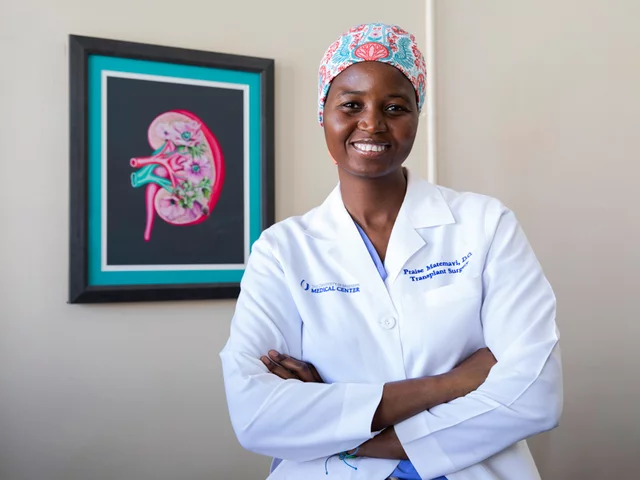Praise Matemavi dreamed of becoming a doctor since he was four years old. At the age of 10, she expressed her desire to become a cardiothoracic surgeon after being inspired by a group of doctors from Loma Linda University in California who visited Zimbabwe to perform congenital heart surgery on children at Parirenyatwa Hospital.
In fifth grade, her supportive father bought her a copy of “Gifted Hands,” which she finished in one night. Her interest was further fueled by Ben Carson’s famous narrative. She preferred to operate on the brain rather than the heart.
At the age of fourteen, she moved to the United States to pursue her love while retaining her scholastic success. Matemavi shared with The Weight She Carries that she has always believed in herself.”I’ve always believed that I could do whatever I wanted. There was never any doubt in my mind that I could accomplish anything.”
Her plans were almost disrupted when she became pregnant at the age of 18. To avoid additional shame for her parents, who were pastors, the pacesetter married the man who had gotten her pregnant, only to find herself in a stormy marriage that nearly killed her.
She held onto her dream and applied to nursing school to augment her income because she lacked US citizenship. She eventually dissolved her marriage after the birth of her second child, believing it was a life-saving decision.
Matemavi pursued her dream of becoming a surgeon after leaving an abusive marriage. She applied to multiple medical schools and prepared for the MCATs. She quickly found herself in another rut. “So now I’ve passed the MCATs, but I don’t have a bachelor’s degree, and all these medical schools require one to get into their programs,” said Matemavi.
“I had all these interviews lined up to get into these medical programs because the schools were under the impression that I would have a bachelor’s degree by the time the program began.”
She approached Sienna Heights University’s academic advisor with a clear strategy and stated her goals.The advisor questioned her ability to complete the 60 credits required for a bachelor’s degree in a single academic year, to which she replied, “I can.”
Matemavi, a single mother with two toddlers, had previously completed a tough program to prepare for the MCATs and was confident in her ability to do it again.After struggling with conflicting class times at Lake Michigan College, she transferred to Southwestern College, a 40-minute drive away, to take 20 credits per semester.
Matemavi, who was 24 years old, would leave her children with a babysitter every morning and attend class all day. After working the 3-11 shift on Fridays, she spent Saturdays with her children and attending church. On Sundays, she worked a double shift from 3 p.m. to 7 a.m., and on Mondays, she would prepare and rush to class.
“I had a timetable.” I hoped to finish medical school by the time I was 29. “That had to happen by any means necessary,” she explained.
She persuaded her advisor to let her take 30 credits in the fall of 2005, and she received As in all of her classes. She earned a bachelor’s degree by taking 30 more credits in the following semester.
She finally attended medical school and remarried. Unfortunately, her rigorous schedule prevented it from working out, and she divorced during her residency.Matemavi, who had been divorced twice, was shattered. Despite the difficulties, she maintained her faith.
Soon after, she received another strike. Matemavi’s mother, who she expected to profit from her success, passed away from inflammatory breast cancer just two months before she was set to graduate from her residency. Her busy schedule gave her less than a week to mourn her mother before returning to work.
The pacesetter readied herself again and set her sights on a difficult task: she wanted to specialize in transplant surgery.She went on to say, “I decided there and then that I was going to do the most difficult thing there is to do…whether it was pediatric cardiac surgery or transplant surgery.”
Despite her medical instructors’ attempts to discourage her, she persisted and became the only woman in her residency class.She persevered and graduated as a transplant surgeon, suffering nights of flying on airplanes to get the necessary pieces for transplantation.
However, the trailblazer admitted that there were times when she felt most undermined, particularly when she went to hospitals to retrieve organs and the hospital staff immediately struck up a conversation with her accompanying assistant—typically a white male—because they assumed he was the surgeon.
“I just let them go ahead because I know they’ll have to come and talk to me eventually so I can tell them what kind of equipment I need and exactly how I want things to go,” she told me. “It’s one of those things I’ve had to learn to deal with and it doesn’t bother me much anymore.”
She married again, this time to a guy who understood her passion and didn’t complain about her work schedule, despite the fact that she worked approximately 120 hours per week and was on call every day.
Matemavi is Zimbabwe’s first female transplant surgeon and one of its youngest, however she works largely in the United States.
According to New Zimbabwe, she is an accomplished author with the following books: “Lessons for my Daughter: Adapted from Life Experience” and “Passion and Purpose: Black Female Surgeons,” focusing on the fortitude of women in the medical sector around the world as they pursue their aspirations.
Culled: howafrica



